Unit 1 What's the matter Section A Grammar Focus-4c课件(共35张PPT)人教版英语八年级下册
文档属性
| 名称 | Unit 1 What's the matter Section A Grammar Focus-4c课件(共35张PPT)人教版英语八年级下册 |
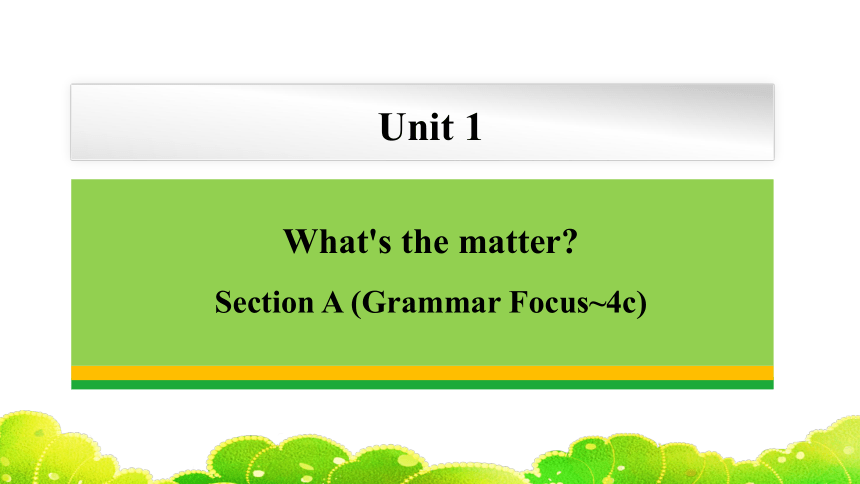
|
|
| 格式 | pptx | ||
| 文件大小 | 4.1MB | ||
| 资源类型 | 教案 | ||
| 版本资源 | 人教新目标(Go for it)版 | ||
| 科目 | 英语 | ||
| 更新时间 | 2024-01-01 20:34:36 | ||
图片预览

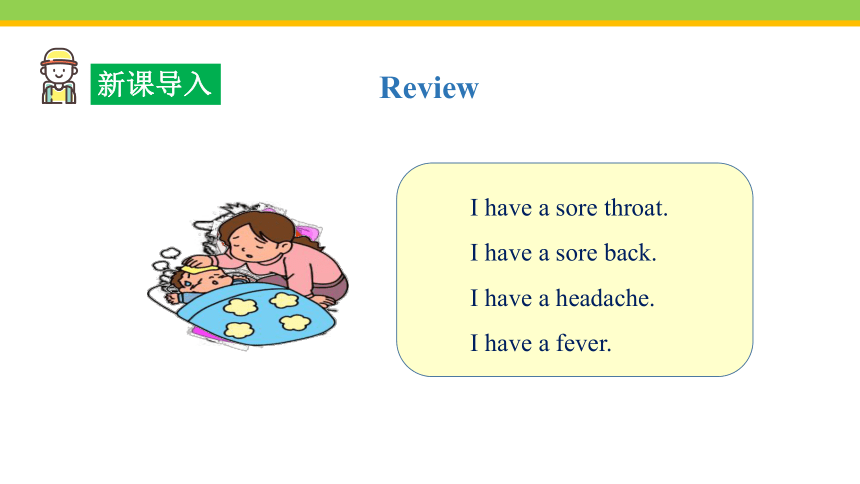
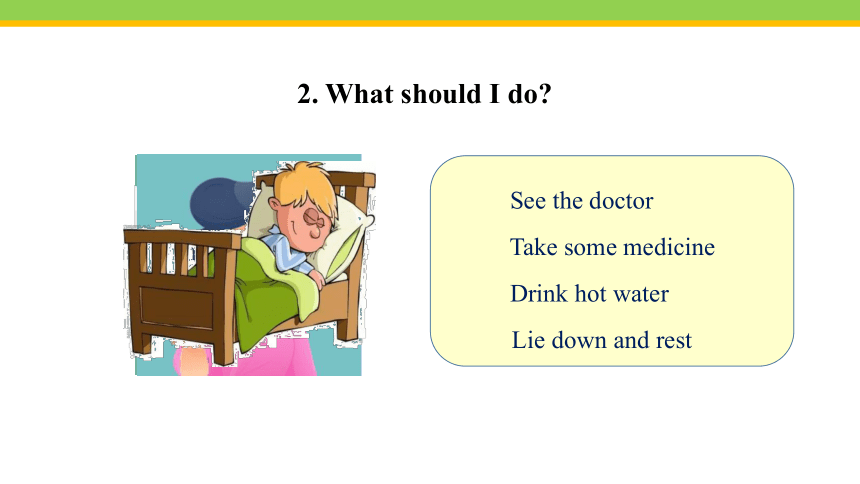
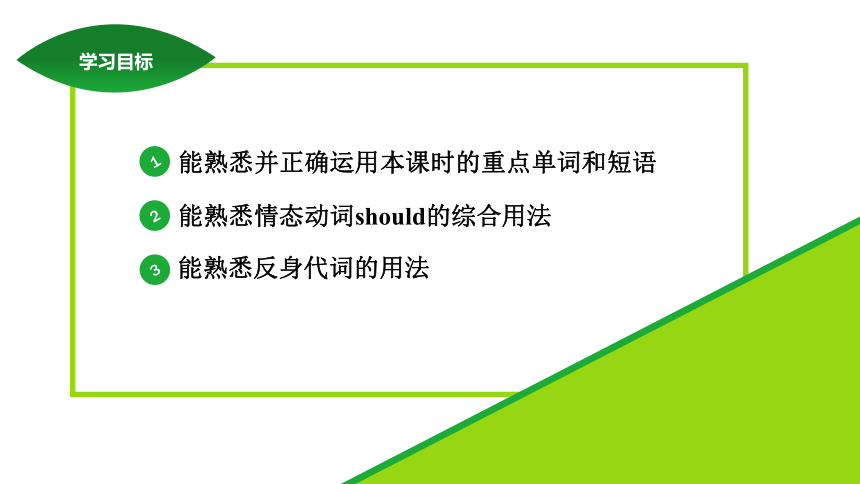

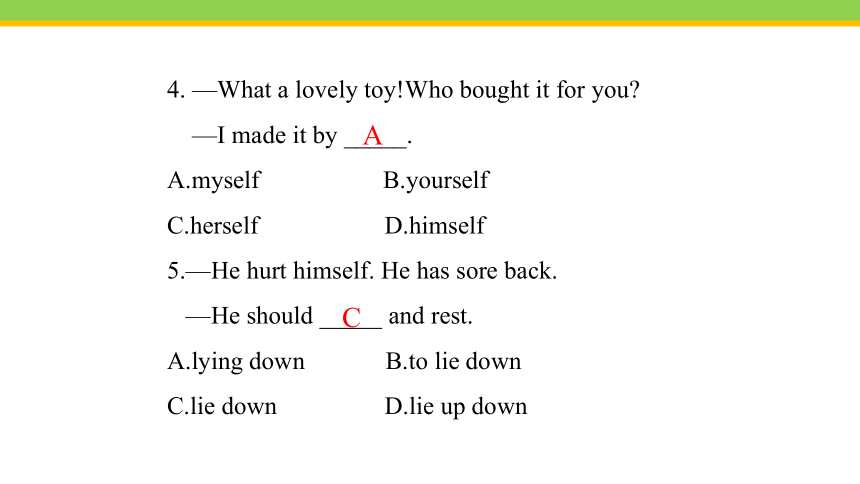
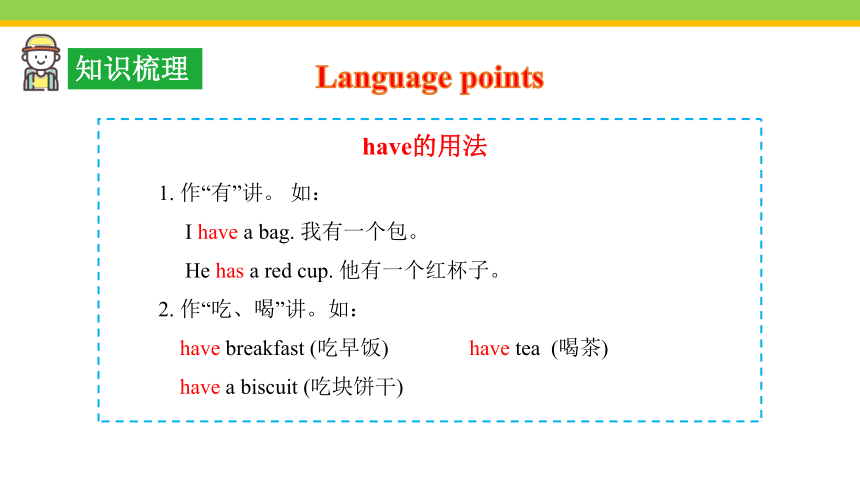
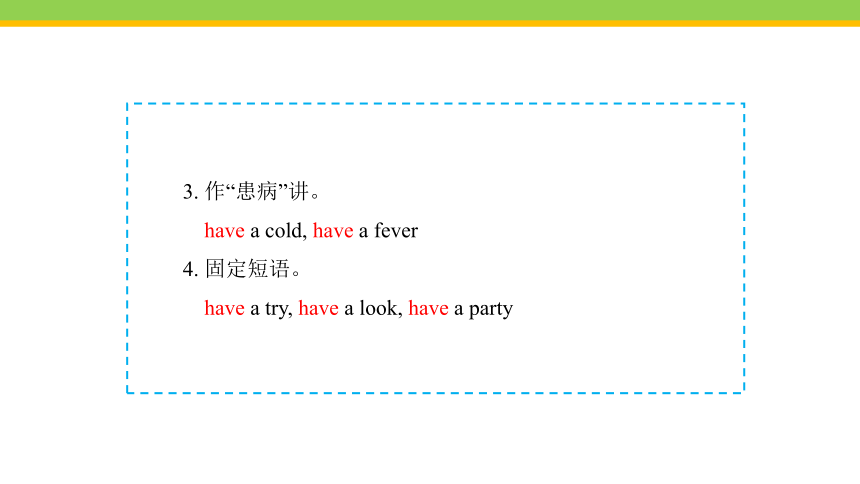
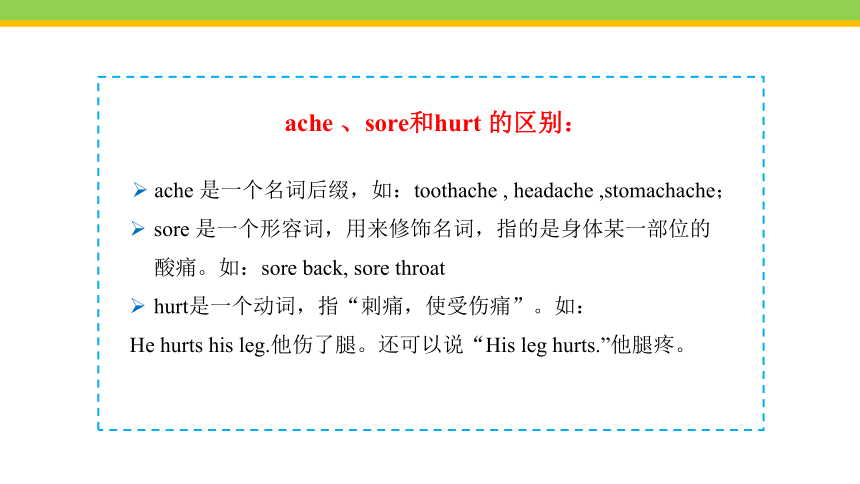
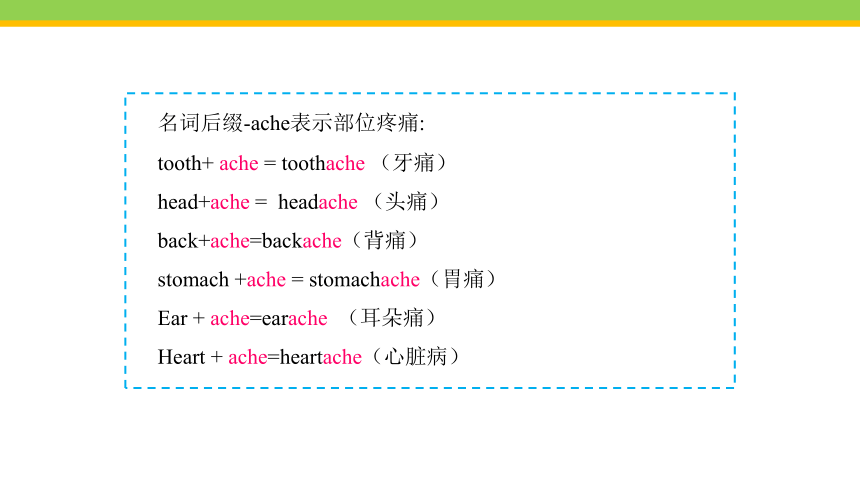
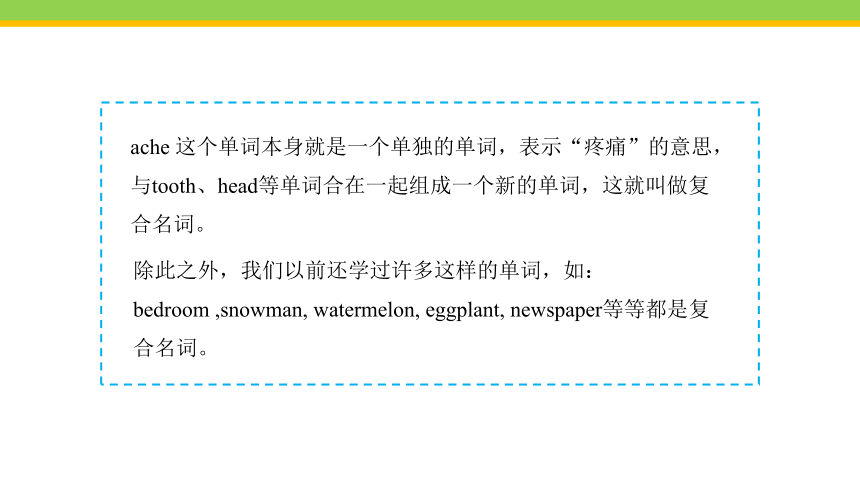
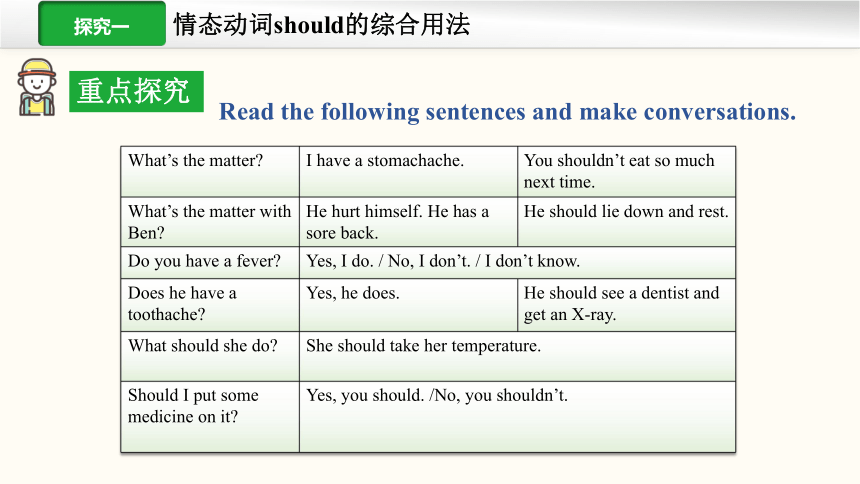
文档简介
(共35张PPT)
Unit 1
What's the matter
Section A (Grammar Focus~4c)
新课导入
Review
I have a sore throat.
I have a sore back.
I have a headache.
I have a fever.
2. What should I do
See the doctor
Take some medicine
Drink hot water
Lie down and rest
2
1
能熟悉并正确运用本课时的重点单词和短语
能熟悉情态动词should的综合用法
3
能熟悉反身代词的用法
预习检测
1. You have a bad headache.Maybe you _____ a doctor.
A.should see B.shouldn’t see
C.should look D.shouldn’t look
2. I have a _____.Maybe I should see a dentist.
A.headache B.toothache
C.stomachache D.sore throat
3.Could you please give me _____
A.any advice B.some advice
C.no advice D.some advices
A
B
B
4. —What a lovely toy!Who bought it for you
—I made it by _____.
A.myself B.yourself
C.herself D.himself
5.—He hurt himself. He has sore back.
—He should _____ and rest.
A.lying down B.to lie down
C.lie down D.lie up down
C
A
知识梳理
Language points
have的用法
1. 作“有”讲。 如:
I have a bag. 我有一个包。
He has a red cup. 他有一个红杯子。
2. 作“吃、喝”讲。如:
have breakfast (吃早饭) have tea (喝茶)
have a biscuit (吃块饼干)
3. 作“患病”讲。
have a cold, have a fever
4. 固定短语。
have a try, have a look, have a party
ache 、sore和hurt 的区别:
ache 是一个名词后缀,如:toothache , headache ,stomachache;
sore 是一个形容词,用来修饰名词,指的是身体某一部位的酸痛。如:sore back, sore throat
hurt是一个动词,指“刺痛,使受伤痛”。如:
He hurts his leg.他伤了腿。还可以说“His leg hurts.”他腿疼。
名词后缀-ache表示部位疼痛:
tooth+ ache = toothache (牙痛)
head+ache = headache (头痛)
back+ache=backache(背痛)
stomach +ache = stomachache(胃痛)
Ear + ache=earache (耳朵痛)
Heart + ache=heartache(心脏病)
ache 这个单词本身就是一个单独的单词,表示“疼痛”的意思,与tooth、head等单词合在一起组成一个新的单词,这就叫做复合名词。
除此之外,我们以前还学过许多这样的单词,如:bedroom ,snowman, watermelon, eggplant, newspaper等等都是复合名词。
重点探究
情态动词should的综合用法
What’s the matter I have a stomachache. You shouldn’t eat so much next time.
What’s the matter with Ben He hurt himself. He has a sore back. He should lie down and rest.
Do you have a fever Yes, I do. / No, I don’t. / I don’t know.
Does he have a toothache Yes, he does. He should see a dentist and get an X-ray.
What should she do She should take her temperature.
Should I put some medicine on it Yes, you should. /No, you shouldn’t.
Read the following sentences and make conversations.
Pair work
What’s the matter
I have a stomachache.
You shouldn’t eat so much next time.
……
Can you translate them into Chinese
4a. Fill in the blanks and practice the conversations.
1. A: I hurt ______ when I played basketball yesterday. What _______ I do
B: You ______ see a doctor and get an X-ray.
2. A: _______ the matter
B: My sister and I ______ sore throats. _______ we go to school
A: No, you _________.
3. A: _____ Mike _____ a fever
B: No, he ________. He _____ a stomachache.
A: He _______ drink some hot tea.
myself
should
should
What’s
have
Should
shouldn’t
should
Does
have
doesn’t
has
Pair work
Role-play the conversations
I hurt myself when I played basketball yesterday. What should I do
You should see a doctor and get an X-ray.
What’s the matter
My sister and I have sore throats. Should we go to school
No, you shouldn’t.
Does Mike have a fever
No, he doesn’t. He has a stomachache.
He should drink some hot tea.
Free talk
Can you summarize the usage of the modal verb should
should的几种常见用法
A.表示征求意见
用于第一、第三人称,多用在间接引语中,以征求对方的意见。
e.g.Mr. Lee asked if he should get his visa tomorrow.
李先生问明天能否拿到签证。
B.表达义务、职责等
e.g.I think today’s children should really learn to respect their elders.
我认为今天的孩子应当好好学习尊敬长辈。
C.要求对方给自己提出意见
用来提供帮助、提出建议,要求对方给出意见。
e.g.How do you think I should deal with all kinds of rumors
你认为我应如何应对各种各样的谣言?
D.表示说话人的特殊情感
表示说话人的特殊感情,如惊奇、愤怒、失望等。
e.g.It’s surprising that Mary should love such a person as Jack.
玛丽竟然爱像杰克这样的人,真是奇怪。
E.表示可能性
表示很大的可能性,常译为“按道理说应该”。
e.g.It’s already 10. She promised to come by 10. She should be here at any moment.
已经10点了,她答应10点之前来的。她随时都可能来到。
活动小结
当堂检测见DCF课件
通过以上的活动,我们学习了情态动词should的综合用法,should作为情态动词用,常表示意外、惊奇、不能理解等,有“竟会”的意思,如:How should I know 我怎么知道?should有时表示应当做或发生的事。如:We should help each other.我们应当互相帮助。 should的几种常见用法:
1.用于表示“ _________________ ”。如:Children should learn to respect the elders.
2.用于表示 _________________ 。如:You should go to the doctor if you feel ill.
如果你感觉不舒服,你应该去看医生。
3.用于表示 _________________ 。should的这一用法是考试中常常出现的考点之一。如:She should arrive here any moment.她随时都能来。
责任、义务
提出意见劝导别人
可能性
反身代词的用法
4b. Circle the best advice for these health problems.
Then add your own advice.
1. Jenny cut herself. She should
(get an X-ray / put some medicine on the cut).
My advice: ______________________________.
2. Kate has a toothache. She should
(see a dentist / get some sleep).
My advice: ________________________.
She shouldn’t eat cold food
She should put a bandage on it
3. Mary and Sue have colds. They shouldn’t
(sleep/ exercise).
My advice: ____________________________.
4. Bob has a sore back. He should
(lie down and rest / take his temperature).
My advice: ______________________.
They shoud drink more water
He should get an X-ray
Pair work
One student mimes a problem. The other students in your group guess the problem and give advice.
What’s the matter Did you hurt yourself playing soccer
No, I didn’t.
Did you fall down
Yes, I did..
You should go home and get some rest.
.....
Name Problem Advice
Liu Peng fall down go home and rest
数/人称 第一人称 第二人称 第三人称
单数
复数
reflexive pronoun (反身代词)
myself
yourself
himself/herself/itself
themselves
yourselves
ourselves
反身代词在句中可作宾语、主语或宾语的同位语、表语。例如:
(1)The child can dress himself.(作宾语)
那个小孩可以自己穿衣。
(2) Mr.Black himself is a doctor.(作主语的同位语)
布莱克先生自己就是一个医生。
(3)You’d better ask Mary herself.(作宾语的同位语)
你最好问玛丽本人。
(4)Just be yourself.(作表语)
做好你自己。
活动小结
当堂检测见DCF课件
通过以上的活动,我们可以知道反身代词的用法,反身代词是表示反射或强调的代词。由第一人称、第二人称形容词性物主代词或第三人称代词宾格形式,词尾加1. _____________ 组成。反身代词可以译为“2. _____________ ”,为加强语气,也常译为“亲自;自己”。反身代词的常用词组:teach oneself 3. _____________ ; learn by oneself(自学); enjoy oneself 4. _____________ ; hurt oneself 5. _____________ ; help oneself to 6. _____________ ; by oneself (独自)。
-self或-selves
本人;本身
自学
过得愉快
受伤
随便吃/用
一、单词填空。
当堂检测
1.The old woman feels _______ (疲劳) after a long walk.
2. His son has a _______ (头疼).
3. I have a ______ ______(嗓子疼), so I can't speak a word.
4. I brush my _______ (牙) twice a day.
5. The little boy eats too much, he has a ___________(肚子疼).
tired
headache
sore throat
teeth
stomachache
二、根据汉语意思完成下列句子。
1. 你应该按时完成作业。
You _______ _______ your homework on time.
2. 你不应该相信陌生人。
You _______ _______ strangers.
3. 我应该打开窗户吗?
_______ _______ _______ the window
4. 她应该量体温。
She _______ _______ her temperature.
should finish
shouldn’t believe
Should I open
should take
课堂总结
Unit 1
Section A (Gramar Focus~4c)
情态动词should的综合用法:
用于表示_________________
用于表示_________________
用于表示_________________
责任、义务
提出意见劝导别人
可能性
反身代词的用法:
反身代词是表示反射或强调的代词。由第一人称、第二人称形容词性物主代词或第三人称代词宾格形式,词尾加1.____________ 组成。反身代词可以译为“2.___________”,为加强语气,也常译为“亲自;自己”。反身代词的常用词组:teach oneself 3.________ ; learn by oneself(自学); enjoy oneself 4.__________; hurt oneself 5.________; help oneself to 6.____________; by oneself (独自)。
-self或-selves
自学
本人;本身
过得愉快
受伤
随便吃/用
Unit 1
What's the matter
Section A (Grammar Focus~4c)
新课导入
Review
I have a sore throat.
I have a sore back.
I have a headache.
I have a fever.
2. What should I do
See the doctor
Take some medicine
Drink hot water
Lie down and rest
2
1
能熟悉并正确运用本课时的重点单词和短语
能熟悉情态动词should的综合用法
3
能熟悉反身代词的用法
预习检测
1. You have a bad headache.Maybe you _____ a doctor.
A.should see B.shouldn’t see
C.should look D.shouldn’t look
2. I have a _____.Maybe I should see a dentist.
A.headache B.toothache
C.stomachache D.sore throat
3.Could you please give me _____
A.any advice B.some advice
C.no advice D.some advices
A
B
B
4. —What a lovely toy!Who bought it for you
—I made it by _____.
A.myself B.yourself
C.herself D.himself
5.—He hurt himself. He has sore back.
—He should _____ and rest.
A.lying down B.to lie down
C.lie down D.lie up down
C
A
知识梳理
Language points
have的用法
1. 作“有”讲。 如:
I have a bag. 我有一个包。
He has a red cup. 他有一个红杯子。
2. 作“吃、喝”讲。如:
have breakfast (吃早饭) have tea (喝茶)
have a biscuit (吃块饼干)
3. 作“患病”讲。
have a cold, have a fever
4. 固定短语。
have a try, have a look, have a party
ache 、sore和hurt 的区别:
ache 是一个名词后缀,如:toothache , headache ,stomachache;
sore 是一个形容词,用来修饰名词,指的是身体某一部位的酸痛。如:sore back, sore throat
hurt是一个动词,指“刺痛,使受伤痛”。如:
He hurts his leg.他伤了腿。还可以说“His leg hurts.”他腿疼。
名词后缀-ache表示部位疼痛:
tooth+ ache = toothache (牙痛)
head+ache = headache (头痛)
back+ache=backache(背痛)
stomach +ache = stomachache(胃痛)
Ear + ache=earache (耳朵痛)
Heart + ache=heartache(心脏病)
ache 这个单词本身就是一个单独的单词,表示“疼痛”的意思,与tooth、head等单词合在一起组成一个新的单词,这就叫做复合名词。
除此之外,我们以前还学过许多这样的单词,如:bedroom ,snowman, watermelon, eggplant, newspaper等等都是复合名词。
重点探究
情态动词should的综合用法
What’s the matter I have a stomachache. You shouldn’t eat so much next time.
What’s the matter with Ben He hurt himself. He has a sore back. He should lie down and rest.
Do you have a fever Yes, I do. / No, I don’t. / I don’t know.
Does he have a toothache Yes, he does. He should see a dentist and get an X-ray.
What should she do She should take her temperature.
Should I put some medicine on it Yes, you should. /No, you shouldn’t.
Read the following sentences and make conversations.
Pair work
What’s the matter
I have a stomachache.
You shouldn’t eat so much next time.
……
Can you translate them into Chinese
4a. Fill in the blanks and practice the conversations.
1. A: I hurt ______ when I played basketball yesterday. What _______ I do
B: You ______ see a doctor and get an X-ray.
2. A: _______ the matter
B: My sister and I ______ sore throats. _______ we go to school
A: No, you _________.
3. A: _____ Mike _____ a fever
B: No, he ________. He _____ a stomachache.
A: He _______ drink some hot tea.
myself
should
should
What’s
have
Should
shouldn’t
should
Does
have
doesn’t
has
Pair work
Role-play the conversations
I hurt myself when I played basketball yesterday. What should I do
You should see a doctor and get an X-ray.
What’s the matter
My sister and I have sore throats. Should we go to school
No, you shouldn’t.
Does Mike have a fever
No, he doesn’t. He has a stomachache.
He should drink some hot tea.
Free talk
Can you summarize the usage of the modal verb should
should的几种常见用法
A.表示征求意见
用于第一、第三人称,多用在间接引语中,以征求对方的意见。
e.g.Mr. Lee asked if he should get his visa tomorrow.
李先生问明天能否拿到签证。
B.表达义务、职责等
e.g.I think today’s children should really learn to respect their elders.
我认为今天的孩子应当好好学习尊敬长辈。
C.要求对方给自己提出意见
用来提供帮助、提出建议,要求对方给出意见。
e.g.How do you think I should deal with all kinds of rumors
你认为我应如何应对各种各样的谣言?
D.表示说话人的特殊情感
表示说话人的特殊感情,如惊奇、愤怒、失望等。
e.g.It’s surprising that Mary should love such a person as Jack.
玛丽竟然爱像杰克这样的人,真是奇怪。
E.表示可能性
表示很大的可能性,常译为“按道理说应该”。
e.g.It’s already 10. She promised to come by 10. She should be here at any moment.
已经10点了,她答应10点之前来的。她随时都可能来到。
活动小结
当堂检测见DCF课件
通过以上的活动,我们学习了情态动词should的综合用法,should作为情态动词用,常表示意外、惊奇、不能理解等,有“竟会”的意思,如:How should I know 我怎么知道?should有时表示应当做或发生的事。如:We should help each other.我们应当互相帮助。 should的几种常见用法:
1.用于表示“ _________________ ”。如:Children should learn to respect the elders.
2.用于表示 _________________ 。如:You should go to the doctor if you feel ill.
如果你感觉不舒服,你应该去看医生。
3.用于表示 _________________ 。should的这一用法是考试中常常出现的考点之一。如:She should arrive here any moment.她随时都能来。
责任、义务
提出意见劝导别人
可能性
反身代词的用法
4b. Circle the best advice for these health problems.
Then add your own advice.
1. Jenny cut herself. She should
(get an X-ray / put some medicine on the cut).
My advice: ______________________________.
2. Kate has a toothache. She should
(see a dentist / get some sleep).
My advice: ________________________.
She shouldn’t eat cold food
She should put a bandage on it
3. Mary and Sue have colds. They shouldn’t
(sleep/ exercise).
My advice: ____________________________.
4. Bob has a sore back. He should
(lie down and rest / take his temperature).
My advice: ______________________.
They shoud drink more water
He should get an X-ray
Pair work
One student mimes a problem. The other students in your group guess the problem and give advice.
What’s the matter Did you hurt yourself playing soccer
No, I didn’t.
Did you fall down
Yes, I did..
You should go home and get some rest.
.....
Name Problem Advice
Liu Peng fall down go home and rest
数/人称 第一人称 第二人称 第三人称
单数
复数
reflexive pronoun (反身代词)
myself
yourself
himself/herself/itself
themselves
yourselves
ourselves
反身代词在句中可作宾语、主语或宾语的同位语、表语。例如:
(1)The child can dress himself.(作宾语)
那个小孩可以自己穿衣。
(2) Mr.Black himself is a doctor.(作主语的同位语)
布莱克先生自己就是一个医生。
(3)You’d better ask Mary herself.(作宾语的同位语)
你最好问玛丽本人。
(4)Just be yourself.(作表语)
做好你自己。
活动小结
当堂检测见DCF课件
通过以上的活动,我们可以知道反身代词的用法,反身代词是表示反射或强调的代词。由第一人称、第二人称形容词性物主代词或第三人称代词宾格形式,词尾加1. _____________ 组成。反身代词可以译为“2. _____________ ”,为加强语气,也常译为“亲自;自己”。反身代词的常用词组:teach oneself 3. _____________ ; learn by oneself(自学); enjoy oneself 4. _____________ ; hurt oneself 5. _____________ ; help oneself to 6. _____________ ; by oneself (独自)。
-self或-selves
本人;本身
自学
过得愉快
受伤
随便吃/用
一、单词填空。
当堂检测
1.The old woman feels _______ (疲劳) after a long walk.
2. His son has a _______ (头疼).
3. I have a ______ ______(嗓子疼), so I can't speak a word.
4. I brush my _______ (牙) twice a day.
5. The little boy eats too much, he has a ___________(肚子疼).
tired
headache
sore throat
teeth
stomachache
二、根据汉语意思完成下列句子。
1. 你应该按时完成作业。
You _______ _______ your homework on time.
2. 你不应该相信陌生人。
You _______ _______ strangers.
3. 我应该打开窗户吗?
_______ _______ _______ the window
4. 她应该量体温。
She _______ _______ her temperature.
should finish
shouldn’t believe
Should I open
should take
课堂总结
Unit 1
Section A (Gramar Focus~4c)
情态动词should的综合用法:
用于表示_________________
用于表示_________________
用于表示_________________
责任、义务
提出意见劝导别人
可能性
反身代词的用法:
反身代词是表示反射或强调的代词。由第一人称、第二人称形容词性物主代词或第三人称代词宾格形式,词尾加1.____________ 组成。反身代词可以译为“2.___________”,为加强语气,也常译为“亲自;自己”。反身代词的常用词组:teach oneself 3.________ ; learn by oneself(自学); enjoy oneself 4.__________; hurt oneself 5.________; help oneself to 6.____________; by oneself (独自)。
-self或-selves
自学
本人;本身
过得愉快
受伤
随便吃/用
同课章节目录
- Unit 1 What's the matter?
- Section A
- Section B
- Unit 2 I'll help to clean up the city parks.
- Section A
- Section B
- Unit 3 Could you please clean your room?
- Section A
- Section B
- Unit 4 Why don't you talk to your parents?
- Section A
- Section B
- Unit 5 What were you doing when the rainstorm came
- Section A
- Section B
- Review of Units 1-5
- Unit 6 An old man tried to move the mountains.
- Section A
- Section B
- Unit 7 What's the highest mountain in the world?
- Section A
- Section B
- Unit 8 Have you read Treasure Island yet?
- Section A
- Section B
- Unit 9 Have you ever been to a museum?
- Section A
- Section B
- Unit 10 I've had this bike for three years.
- Section A
- Section B
